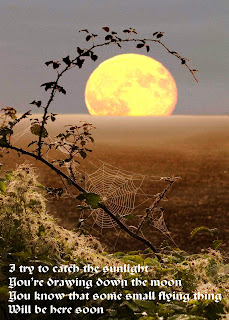Here is the version I shall read at 13.15 on Saturday 6 October in the Lear Exhibition Gallery.
Jerusalem A poem
by Nick Owen 2012
We look over his
shoulder
At Shepherds
standing by,
Unmindful of the
city.
An open sky is
heaven enough for them.
But shining on the
other hill
The artist shows so
clear
The place they call
Jerusalem
So far and yet so
near.
A valley lies below
us, bare and dark.
For me this has to
be the shadow of death,
A place of
desolation, fearful, stark,
Where all too many
soldiers took their final breath.
Armies of the past,
and of the future too;
We do not see them
now upon the ground
And yet I think I
hear their dreadful sound.
Over his shoulder
we see some goats or sheep
In pastures almost
green,
A peaceful,
restful, pastoral scene;
Even the rocks are
bright and clean.
He might have drawn
on William Blake.
These could be northern
English hills;
An English man’s Jerusalem to make,
Not covered in satanic
mills.
Out of nowhere, a
God without a face
Compels the souls
of men to make for this.
It whispers to the
world, “This is the place
Which, more than
any other, is the source of bliss,
More powerful, more
wonderful than any lover’s kiss.
For, if there is
redemption, it is here.
Come all ye, and
enter without fear”.
Our fathers went on
pilgrimage to reach this holy city,
A pure white
shining citadel beyond decay.
In hope to reach
eternity, they made their way,
With prayers in
many tongues, and oaths to say.
Some came in peace,
some came in holy war
They shared a
sacred dream,
Some thing, for
them, worth fighting for.
Thousands fought
and thousands died
And thousands more
will fight and die
To hold this land. Many have tried
To find a way of
peace, but many lie
And will lie again.
I ask you why?
When you believe
that God is on your side
You do not count
the dead, or lose your pride.
We look over his
shoulder
For a dream that we
hope to come real
A place of love and
beauty, peaceful games,
A place with
magnetism, a serene appeal,
Where conflicts end
in happy resolution.
But all these hopes
are turned to desperation,
The darkness
spreading higher on the hill,
As war threatens
death to every nation.
Christian, Moslem,
Arab, Jew,
The jealous God
that was just for you
Can change his mind,
adding new revelation.
Acceptance might
transform your indignation.
Please set aside
the gun and bomb,
Or I fear the end
of days will come,
Jerusalem itself will be no more.
The breathless
child Lear left behind
Escaping into
nonsense or fine birds
And pastoral
landscapes of this remarkable kind,
Where life becomes
more real, less absurd,
And men sit
silently, no words
Upon their lips.
Perhaps his promises had all been kept
Or maybe he has stood
here, painting while he wept.



